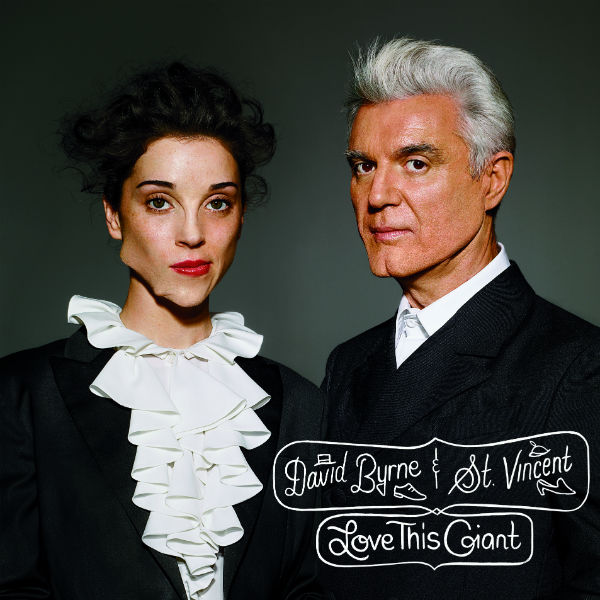Videos by American Songwriter
David Byrne and St. Vincent
Love This Giant
(Todo Mundo/4AD)
3 out of 5 stars
Ever since he exclaimed that this wasn’t his beautiful house and certainly not his beautiful wife on the Talking Heads hit “Once In A Lifetime,” David Byrne has been fascinated by the casual banality and odd existentialism of American life. Songs like “Burning Down The House” and “(Nothing But) Flowers” amplify the all-is-well universality of suburban homes and Pizza Hut parking lots until they take on a dreamlike quality, which is only intensified by his slightly detached mien and his reliance on African polyrhythms.
As Byrne has aged, the idea of alienating normalcy has guided full albums rather than individual songs, and if his music has grown somewhat tedious over the last two decades, it’s not necessarily because Byrne is so far removed from his subject matter. Instead, the subject has lost its edges simply through repetition. He’s been expounding on these ideas for nearly forty years, and he always seems to be reaching the same conclusions from one song to the next. As a result, the banality that fascinates him always threatens to infect his music, as it did on solo albums like Uh-Oh and Feelings in the 1990s.
In the last five or six years, however, he has reinvigorated himself by working with a range of musical collaborators who can add new depth to his particular worldview. Byrne teamed with Eno again for 2008’s Everything That Happens Will Happen Today (perhaps his best late-career album) and recorded a handful of songs with the Dirty Projectors. He co-wrote the double album Here Lies Love, a musical biography of Filipino First Lady Imelda Marcos, with big-beat DJ Fatboy Slim. Earlier this year, he recorded the album Live At Carnegie Hall with Brazilian vocalist Caetano Veloso.
Even among such impressive and eclectic company, Annie Clark seems like an especially apt collaborator. Recording under the name St. Vincent, she has established herself as a fearlessly inventive guitar player, arguably the best working today. As a vocalist she can be a fascinatingly evasive presence. The woman who titled her second album Actor slips into and out of different roles from one song to the next, yet she remains impossibly relatable even at her most cerebral. If anyone can meet Byrne eccentricity for eccentricity, it’s Clark.
Still, it’s hard to listen to Love This Giant and not feel gently disappointed. Two years in the making, it sounds less like a collaboration among equals and more like a Byrne record with an extended cameo. She’s an actress in his auteur film, playing a pre-scripted role. When she cuts loose, as she does on the runaway “Ice Age,” she can be bracing, reminding you what a formidable artist she can be. On “The Forest Awakes,” she lays down a sly, subtle solo – just a few blunt, ferocious chords that convey more than you might think possible. In general, however, her guitar is only a secondary instrument; much like recent Byrne efforts, Love This Giant is a horns album. They’re fluttery and disjointed, possibly mimicking the postpunk herky-jerk of Clark’s solo material. It’s an intriguing sound: “I Should Watch TV” and “The One Who Broke Your Heart” (featuring the Dap-Kings and Antibalas) have the abrasive and percolating energy of Philip Glass covering Gang of Four, as the horn charts take on the quality of fractal art: an infinite regress of brass and reeds.
On “Who” and “Lazarus,” their voices mesh well, Byrne’s slightly detached delivery softened by Clark’s luxuriantly human tone. Love This Giant is best when the play up that dissonance, yet too often they separate themselves. There are too few duets and too many isolated leads, suggesting a he said/she said quality that is conceptually intriguing but musically self-defeating. It’s too bad, since these two steely artists share a gift for making music that is both cerebral and soulful. What stands out, then, isn’t the high concept, but the curious details, such as the uncanny existentialism of “Lightning”: “And if I should wake up and find my bed’s been moved six inches,” Clark sings on “Lightning.” “Oh nature, I hope you have a laugh.” There are just enough of these deeply unsettling moments to make the album at the very least a curio in these artists’ catalog, if not necessarily a triumph.














Leave a Reply
Only members can comment. Become a member. Already a member? Log in.